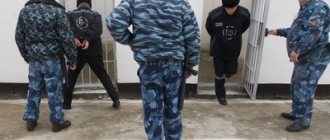According to Article 47 of the Criminal Code of the Russian Federation, deprivation of the right to engage in certain activities or occupy specific positions is a type of criminal punishment, which consists of a prohibition or restriction to engage in certain types of activities, as well as to occupy certain positions. The restrictions are divided during the period determined by the court verdict; this punishment applies exclusively to positions of civil servants and persons engaged in activities through which they committed crimes or could commit them in the future.
Deprivation of the right to engage in a specific activity implies not only a ban on working in a profession, but also on a separate activity not related to any profession.
The main objective of deprivation of the right to engage in certain activities is to prevent the commission of crimes by persons whose actions were carried out with abuse of official powers or with the implementation of any activity. It should be taken into account that the ban may apply to any activity that is regulated by the legislation of the Russian Federation. The range of positions of civil servants, the right to occupy which may be limited by the court, is determined in accordance with the Federal Law “On the Civil Service System in the Russian Federation”, as well as the Federal Law “On Municipal Service in the Russian Federation”. It is worth noting that this type of punishment cannot be applied to positions not related to state or municipal service. The type of position the occupation of which is prohibited must be specified in the court verdict.
Important! According to the law, for the same criminal act, a convicted person cannot be given two punishments at the same time - and deprivation of the right to hold a position and engage in certain activities. However, in the case where, due to the nature of the crimes committed by the offender and taking into account his personality, the court finds it impossible to retain his right to occupy a certain position, as well as to continue activities in a certain area, the use of both types of restrictions is allowed.
Deprivation of the right to hold office as a primary and additional punishment
This type of criminal punishment, such as deprivation of the right to hold a position and engage in certain activities, can be imposed both as a primary punishment and as an additional one. As the main punishment, deprivation of the right to hold positions and work in certain activities is imposed for a period of one to five years, or by replacing a specific punishment with a more lenient punishment (for example, Articles 64, 80, Part 3 of Article 82 of the Criminal Code ), or when it is directly provided for in the articles of the Criminal Code of the Russian Federation. For example:
- Article 285 of the Criminal Code of the Russian Federation “Abuse of official powers”;
- Article 169 of the Criminal Code of the Russian Federation “Obstruction of legal business activity”;
- Article 145.1 of the Criminal Code of the Russian Federation “Non-payment of wages, pensions, scholarships, benefits and other payments” and more.
Important! The court has the right to impose this type of punishment even if the convicted person is dismissed from his previous place of work by the time the sentence is pronounced, as well as due to the deprivation of his rights to drive vehicles in an administrative manner.
As an additional punishment, it is applied for a term of six to three years:
- when it is indicated as the main one in the relevant article of the code, but the court has not chosen it in this capacity;
- when this punishment is contained in sanctions, as an additional one, for example, Part 3.4 of Art. 122 of the Criminal Code of the Russian Federation, Art. 135 of the Criminal Code of the Russian Federation and others;
- when there is no indication of this punishment in the sanction of an article of the Criminal Code of the Russian Federation, but the court, taking into account the nature and degree of public danger of the criminal act committed, as well as the identity of the perpetrator, recognizes the impossibility of preserving his right to engage in certain activities and hold a specific position (Part 3 of Art. 47 of the Criminal Code of the Russian Federation).
Part 2 Art. 47 of the Criminal Code of the Russian Federation - in cases specifically provided for by the relevant articles of the Special Part of the Criminal Code, deprivation of the right to hold certain positions or engage in certain activities as an additional type of punishment is established for a term of up to 20 years.
Commentary to Art. 47 Criminal Code
1. Deprivation of the right to hold certain positions consists of a prohibition to hold positions only in the civil service or in local government bodies. The specific type of such positions must be indicated in the sentence.
2. When imposing a sentence in the form of deprivation of the right to engage in certain activities, the sentence specifies the type of such activity (pharmaceutical, teaching, managing public or private transport, providing legal services, etc.). An activity of the same nature, depending on the circumstances, can be professional or other (for example, driving a vehicle).
3. Deprivation of the right to hold certain positions or engage in certain activities may be imposed as both a primary and an additional type of punishment. The court has the right to apply to a person who has committed a crime in connection with his position or while engaging in certain activities, as an additional type of punishment, deprivation of the right to occupy certain positions or engage in certain activities, regardless of the fact that this type of punishment is not provided for by the sanction of the law under which the perpetrator was convicted , citing in the descriptive and motivational part of the verdict the reasons for the decision made. It does not matter whether the person performed the relevant duties permanently or temporarily, by order or direction of the relevant official. The fact that at the time of sentencing a person did not hold a certain position or was not engaged in certain activities does not deprive the court of the right to impose this punishment.
4. The period of deprivation of the right to hold certain positions or engage in certain activities does not count the time during which the convicted person held positions prohibited for him or was engaged in activities prohibited for him (Article 36 of the Penal Code of the Russian Federation).
Methods of execution of punishment
The criminal legislation of the Russian Federation provides for two ways of executing punishment in the form of deprivation of the right to hold a certain position or engage in certain activities, this is in accordance with Part 4 of Art. 47 of the Criminal Code of the Russian Federation:
- parallel - carried out simultaneously with the main punishment;
- sequential - carried out after the convicted person has served the main type of punishment for the crime committed.
When it comes to the parallel execution of an additional type of punishment, which is assigned to fines, correctional and compulsory labor, restriction of freedom, or subject to a suspended sentence, the period for calculating the punishment begins from the moment the sentence enters into legal force. When deprivation of the right to engage in certain activities is imposed in addition to arrest or imprisonment, this type of punishment applies to the entire period of serving the main one, its term is calculated from the moment of their actual departure, i.e. from the date of release of the convicted person from the main punishment.
Second commentary to Art. 47 of the Criminal Code of the Russian Federation
1. Deprivation of the right to hold certain positions means a prohibition to hold positions in the civil service or service in local government bodies.
2. Deprivation of the right to engage in a certain activity means a prohibition to engage in a certain profession (medical worker, teacher, accountant, lawyer, legal adviser, etc.). or other (hunting, fishing, collecting medicinal plants, private transportation, etc.) activities.
3. This punishment can be applied both as a main and as an additional type of punishment.
4. As the main punishment, it may be imposed:
a) when indicated as such in the sanction of an article of the Special Part of the Criminal Code of the Russian Federation;
b) in case of their application as a more lenient punishment than that provided for this crime (Article 64 of the Criminal Code);
c) in the event of a jury verdict of leniency (Article 65 of the Criminal Code);
d) in case of replacement of the unserved part of the punishment with a more lenient one (Article 80 of the Criminal Code).
5. This additional punishment may be imposed in cases where it is not provided for by the sanction of the relevant article of the Special Part of the Criminal Code of the Russian Federation, if, taking into account the nature and degree of public danger of the crime committed and the identity of the perpetrator, the court finds it impossible to preserve his right to occupy certain positions or engage in certain activities. activities.
6. This punishment is imposed as a primary punishment for a period of 1 to 5 years, and as an additional punishment for a period of 6 months to 3 years. However, in cases specifically provided for by the sanctions of the articles of the Special Part of the Criminal Code, it may be imposed as an additional punishment for a term of up to 20 years (for example, parts 3 and 4 of Article 131 of the Criminal Code).
7. When this type of punishment is imposed as an addition to compulsory labor, correctional labor, restriction of freedom, as well as in the case of a suspended sentence, its term is calculated from the moment the sentence enters into legal force. As an additional punishment to arrest, detention in a disciplinary military unit, forced labor and imprisonment, it applies to the entire period of serving these types of punishments, but its term is calculated from the moment they are served.
What else you need to know about deprivation of the right to hold a certain position
Typical examples of crimes for which it is necessary to impose this type of punishment include transport crimes, bribery, illegal hunting, embezzlement or embezzlement, HIV infection, and others.
When imposing such a punishment as deprivation of the right to engage in certain activities, the court must take into account not only the identity of the perpetrator and the nature of the crime, but such an important point as the social aspect of its application:
- social value of the profession - does society need such specialists, the consequences of excluding this specialist from public activities, social costs for training a particular specialist, etc.;
- individual and social costs for the acquisition of another specialty by a convicted person.
The court has the right to impose this punishment even in cases where the person performed the relevant duties temporarily and by the time the sentence was pronounced was no longer engaged in the activities with which the crime was committed.
Criminal legal characteristics of deprivation of the right to engage in certain activities
The right to work is one of the fundamental civil rights. In this regard, the Constitution of the Russian Federation (hereinafter referred to as the Constitution of the Russian Federation) in paragraph 1 of Article 37 declares: “Labor is free. Everyone has the right to freely manage their ability to work, choose their type of activity and profession” [3]. However, the rights and freedoms of man and citizen may be limited by federal law, as specified in paragraph 3 of Article 55 of the Constitution of the Russian Federation. One of these provisions for restricting labor and related rights provided for by federal laws is the imposition of deprivation of the right to engage in certain activities as a punishment for a person for committing a crime.
Deprivation of the right to engage in certain activities is one of the types of criminal penalties, however, its mention in the Criminal Code of the Russian Federation (hereinafter referred to as the Criminal Code of the Russian Federation) is carried out in a single formulation with another type of criminal penalties - deprivation of the right to occupy certain positions, which is indicated in paragraph “b” of the article 44 of the Criminal Code of the Russian Federation [7]. These two types of criminal penalties are very close in content, but they cannot be called identical. To clarify this issue, one should refer to the acts of the Plenum of the Supreme Court of the Russian Federation.
The Plenum of the Supreme Court of the Russian Federation in paragraph 9 of Resolution No. 58 of December 22, 2015 “On the practice of imposing criminal punishment by the courts of the Russian Federation” distinguishes between these two types of crimes, making it possible to more clearly determine the difference in their content. In particular, deprivation of the right to hold certain positions consists of a prohibition to hold positions only in the civil service or in local government, while the sentence must indicate a range of positions defined by specific characteristics. Deprivation of the right to engage in certain activities can be expressed in a prohibition to engage in both professional and other activities. The sentence should specify the type of such activity (teaching, medical, transport management, etc.) [4]. As we see, the nature of prohibitory orders (restrictions) is very different for these two types of crimes, although they are carried out in the form of deprivation of rights.
Deprivation of the right to engage in certain activities can be applied both as a main and as an additional type of punishment, as evidenced by Part 2 of Article 45 of the Criminal Code of the Russian Federation [7], i.e. In the classification of punishments based on the legislative type, purpose and punitive load, this punishment is a mixed type.
Deprivation of the right to engage in certain activities is regulated in more detail by Article 47 of the Criminal Code of the Russian Federation. Based on the provisions enshrined in Part 2 of this article, we can conclude that deprivation of the right to engage in certain activities is an urgent type of punishment, since the law establishes a certain period during which the rights of the convicted person are limited. Based on the provisions of this part of the article, deprivation of the right to engage in certain activities is established for a period of one to five years, and as an additional type of punishment - for a period of six months to three years [7]. At the same time, the legislator makes a reservation in part 3 of Article 47 of the Criminal Code of the Russian Federation that when imposing deprivation of the right to engage in certain activities as an additional type of punishment, if it is not specified in the sanction of the corresponding article of the Special Part of the Criminal Code of the Russian Federation, the law enforcer must be guided by the nature and degree of public the danger of the crime, as well as the personality of the perpetrator [7], so that the appointment of this type of punishment is appropriate and justified. We can conclude that deprivation of the right to engage in certain activities is classified as an urgent type of punishment according to the classification of crimes based on the duration of their execution established by law.
Part 4 of Article 47 of the Criminal Code of the Russian Federation establishes the procedure for calculating the time during which the rights of a convicted person to engage in certain activities are limited as an additional type of punishment [7]. If this type of punishment is imposed as an additional punishment to compulsory labor, correctional labor, restriction of freedom, as well as in the case of a suspended sentence, its term is calculated from the moment the court verdict enters into legal force. If deprivation of the right to hold certain positions or engage in certain activities is imposed as an additional type of punishment to arrest, detention in a disciplinary military unit, forced labor, or imprisonment, it applies to the entire period of serving the specified main types of punishment, but its term is calculated from the moment their departure.
The Criminal Executive Code of the Russian Federation (hereinafter referred to as the Penal Code of the Russian Federation) regulates in more detail the calculation of the period of deprivation of the right to engage in certain activities. So, according to Part 1 of Article 36, when assigning this type of punishment as both the main and additional types of punishment to a fine, compulsory labor, correctional labor or restriction of freedom, as well as with a suspended sentence, if the execution of the additional type of punishment is not suspended, calculated from the moment the court verdict enters into legal force [6]. The term of the specified punishment does not count the time during which the convicted person held positions prohibited for him or was engaged in activities prohibited for him. It is important to clarify in part 2 of Article 36 of the Penal Code of the Russian Federation, according to which, when deprivation of the right to hold certain positions or engage in certain activities is imposed as an additional type of punishment to forced labor, arrest, detention in a disciplinary military unit, imprisonment, the term of said punishment is calculated accordingly from the day release of a convicted person from a correctional center, from arrest, from a disciplinary military unit or from a correctional institution [6].
Those. we can conclude that the calculation of the period of deprivation of the right to engage in certain activities depends not only on whether it was assigned as a main or additional type of punishment, but also on what types of main punishments it was assigned as an additional one.
At the same time, paragraph 28 of Order of the Ministry of Justice of the Russian Federation dated May 20, 2009 N 142 “On approval of instructions for organizing the execution of punishment and measures of a criminal legal nature without isolation from society” reveals the provision on the date from which the period of deprivation of the right to engage in certain activities is calculated: “Term deprivation of the right to hold certain positions or engage in certain activities is calculated from the moment the court sentence enters into legal force, and when this punishment is imposed as an additional punishment to imprisonment, from the day the convict is released from the correctional institution" [5]. As we can see, the moment from which the period of deprivation of the right to engage in a certain activity begins to run depends on whether this punishment was imposed as a primary or additional type of punishment.
The punitive content of deprivation of the right to engage in certain activities as an urgent type of punishment lies in the restrictions on the rights to which the convicted person is subjected and in the duration of these restrictions. In the textbook “Criminal Law: General Part” edited by V.A. Utkin and A.V. Shesler, it is said that suffering in this case is associated with the loss of the opportunity to engage in a professional activity freely chosen in accordance with one’s preferences, and the advantages of the powers of the position held [1]. Those. we can conclude that the restrictions that constitute the punitive content of this type of crime include, first of all, restrictions on labor rights, namely, restrictions on the right to choose the sphere or place of work, as well as to engage in other activities.
Next, we will determine what types of punishments include deprivation of the right to engage in certain activities in other classifications.
In the classification based on a direct indication of the persons to whom punishments are applied or in the absence of such an indication, deprivation of the right to engage in certain activities refers to the general type of punishment, i.e. The legislator has not identified a special category of subjects to whom this punishment is applied.
In the classification based on the basic punitive content, deprivation of the right to engage in certain activities refers to a type of punishment not related to placement in a special institution, because When carrying out this type of punishment, the convicted person is not isolated from society, however, his other rights are affected.
In the classification based on the punitive limit of punishment, deprivation of the right to engage in certain activities falls into the category of ordinary ones, because there is a punitive limit (the maximum period for its appointment), and it does not contribute to the destruction of a person either as a social or as a biological being, as happens when an excess term of imprisonment is assigned.
Also, sometimes in science there is a classification of criminal penalties, taking into account the sphere of material interests of the convicted person and the direction of punishment. In this classification, deprivation of the right to engage in certain activities is classified as a non-property crime, since its appointment and execution affects personal non-property civil rights (the right to freedom of labor and related ones).
Issues related to the more detailed application of deprivation of the right to engage in certain activities as punishment are described in more detail in Resolution of the Plenum of the Supreme Court of the Russian Federation dated December 22, 2015 N 58 “On the practice of imposing criminal punishment by the courts of the Russian Federation.” The Supreme Court of the Russian Federation focuses the attention of the courts on the fact that an additional punishment in the form of deprivation of the right to engage in certain activities, if there are grounds for this and taking into account circumstances mitigating and aggravating the punishment, discuss the question of the advisability of its application in relation to a person for whom the relevant activity is associated with his only profession [4]. Those. in cases where deprivation of the right to engage in a certain activity will deprive the convicted person of essentially the only way to receive money in the professional sphere, the courts are recommended to take this circumstance into account and, possibly, impose a different punishment.
Also, paragraph 11 of the Resolution of the Plenum of the Supreme Court of the Russian Federation dated December 22, 2015 N 58 “On the practice of imposing criminal punishment by the courts of the Russian Federation” determines that for the same crime, deprivation of the right to hold certain positions and engage in certain activities cannot be imposed at the same time, which includes also to their appointment as the main and additional types of punishment [4]. However, these types of punishments can be assigned to a convicted person; they can be assigned to a convicted person at the same time, albeit for different crimes or for different sentences.
The authorities executing punishment in the form of deprivation of the right to engage in certain activities are described in Part 2 of Article 16 of the Penal Code of the Russian Federation. The law includes the criminal-executive inspection, a correctional institution and a disciplinary military unit as such bodies [6]. The legislator also emphasizes that the requirements of a sentence on deprivation of the right to engage in certain activities are fulfilled by the administration of the organization in which the convicted person works, as well as by bodies authorized in accordance with the law to revoke permission to engage in the relevant activity. Those. the body executing the punishment or the requirements of the sentence directly depends on the nature of the activity the prohibition is imposed on. At the same time, the correctional institution and disciplinary military unit are engaged in the execution of punishment in the form of deprivation of the right to engage in certain activities if this punishment is assigned as an additional one, and after his release from the correctional institution or disciplinary military unit, the execution is also carried out by the criminal-executive inspection.
The process of executing a sentence in the form of deprivation of the right to engage in certain activities by the penal inspection is described in detail in section IV (paragraphs 27-41) of Order of the Ministry of Justice of the Russian Federation dated May 20, 2009 N 142 “On approval of instructions for organizing the execution of punishment and measures of a criminal legal nature without isolation from society" [5]. I consider it inappropriate to list all the provisions within the framework of this work, but in short, having received a verdict or other judicial act, the penal inspection draws up and requests the relevant documents, registers the convicted person, establishes the place of work of the convicted person, and in relation to an unemployed convicted person, the inspection monitors him possible employment, sends documents to the organization or the registration authority, requests documents on the dismissal of the convicted person; for the purpose of further control, the inspectorate at least once every six months checks, by visiting the place of work of the convicted person, the execution of the court sentence by the administration of the organization and the convicted person, and, if necessary, checks the employment contract and job description, organizes educational work, and upon completion of the convict’s serving his sentence, removes him from the register.
The law imposes additional obligations on a person sentenced to deprivation of the right to engage in certain activities. They are described in Article 37 of the Penal Code of the Russian Federation, namely, they include: fulfillment of the requirements of the sentence, submission at the request of the penal inspection of documents related to serving the specified sentence, notification to the penal inspection about the place of work, its change or dismissal from work , as well as about changing the place of residence [6].
Of course, in the event of malicious evasion of the duties described above, the legislation establishes the appropriate legal consequences. At the same time, Article 38 of the Criminal Code of the Russian Federation does not specifically disclose these consequences, but only at the end of the article it refers to: “bear responsibility in the manner established by the legislation of the Russian Federation” [6], thereby, as if referring to the criminal act specified in Article 315 of the Criminal Code of the Russian Federation – failure to comply with a court verdict, court decision or other judicial act. At the same time, Article 38 of the Penal Code of the Russian Federation describes the categories of persons who are liable for malicious evasion of this type of punishment, including: government officials, civil servants, municipal employees, employees of state or municipal institutions, commercial or other organizations, as well as convicted persons , violating the requirements of the sentence [6].
The scope of sanctions in the articles of the Special Part of the Criminal Code of the Russian Federation depriving the right to engage in certain activities is quite wide. Among the crimes for which this type of punishment can be imposed are causing death by negligence due to improper performance by a person of his professional duties (Part 2 of Article 109 of the Criminal Code of the Russian Federation), incitement to suicide (Article 110 of the Criminal Code of the Russian Federation), the use of slave labor in the presence of qualifying criteria (Part 2 of Article 127.2 of the Criminal Code of the Russian Federation) and so on [7]. However, this punishment as deprivation of rights is used in practice as the main punishment extremely rarely. This position is emphasized by V.A. Utkin in the course of lectures “Problems of the Theory of Criminal Punishments”, citing statistical data according to which: “it is assigned to 0.05–0.08% of all adult convicts and even less often to minors. Somewhat more often it is used as an additional punishment (1–1.5% for adults and less than 1% for juvenile prisoners). Among all those registered with penal inspections, those sentenced to deprivation of rights are one of the least numerous.” Therefore, it is quite logical after this that the author of the work cites as an example a point of view according to which there are proposals to exclude this punishment from among the main ones due to its rare use. Opinions are also expressed to remove deprivation of rights from the punishment system, including it in “other measures of a criminal law nature” [2]. These statements are quite logical, because the legislator has not given a clear solution to the problem of applying deprivation of the right to engage in certain activities. Based on this, the conditions for deprivation of the right to engage in certain activities in the criminal punishment system are not completely clear.
Let's summarize: deprivation of the right to hold certain positions and engage in certain activities are punishments that are similar in content; in the Criminal Code of the Russian Federation they are often found in a single wording, but the explanations of the Plenum of the Supreme Court of the Russian Federation made it possible to clearly define the difference; deprivation of the right to engage in certain activities in legislation can be prescribed both as a main and as an additional type of punishment, thereby complicating the mechanism of its execution and complementing the circle of entities executing it; also, the legislator has not logically established a mechanism for calculating the duration of this type of crime, dividing the provisions between the Criminal Code and the Criminal Code; statistical data also show that this type of punishment is used extremely rarely and science has expressed doubts about the need for it to be in the punishment system.
Bibliography.
1) V.A. Utkin, A.V. Shesler. Criminal law. General part: study guide. / Under general ed. V.A. Utkina, A.V. Shesler. – Tomsk: Publishing House of Tomsk State University. – 2016 – P. 373-377.
2) V.A. Utkin. Problems of the theory of criminal penalties: a course of lectures. / Utkin V.A. – Tomsk: Publishing House of Tomsk State University. – 2021. – P. 195-201.
3) Constitution of the Russian Federation: adopted by popular vote on December 12, 1993. // ConsultantPlus, URL: https://www.consultant.ru/document/cons_doc_LAW_28399.
4) Resolution of the Plenum of the Supreme Court of the Russian Federation “On the practice of applying criminal punishment by the courts of the Russian Federation” dated December 22, 2015 N 58 // ConsultantPlus, URL: https://www.consultant.ru/document/cons_doc_LAW_190932.
5) Order of the Ministry of Justice of the Russian Federation “On approval of the Instructions for organizing the execution of sentences and measures of a criminal legal nature without isolation from society” dated May 20, 2009 N 142 // ConsultantPlus, URL: https://www.consultant.ru/document/ cons_doc_LAW_89167.
6) Criminal Executive Code of the Russian Federation: Federal Law of January 8, 1997 N 1-FZ // ConsultantPlus, URL: https://www.consultant.ru/document/cons_doc_LAW_12940.
7) Criminal Code of the Russian Federation: Federal Law of June 13, 1996 N 63-FZ // ConsultantPlus, URL: https://www.consultant.ru/document/cons_doc_LAW_10699.







